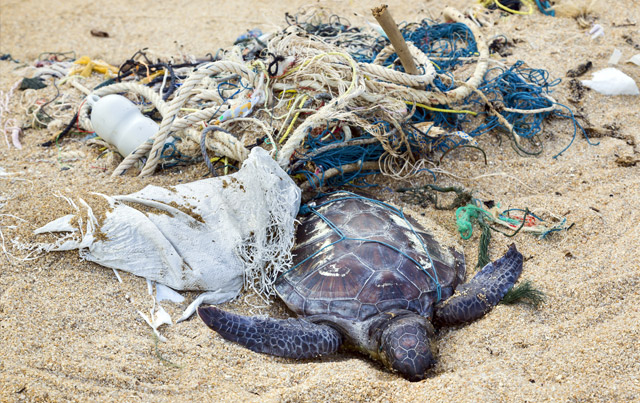Trash is literally trashing the oceans. Sure you've heard it all before about garbage making the oceans an aquatic dump, it's nothing new to you. Well today I'm going to be taking a look at some of the dangers that garbage is currently presenting to several different animals in the oceans today. Here's just a microscopic example of the types of trash that wind up in the oceans on a daily basis. Plastic, fishing gear, glass bottles, fishing gear of all kinds, and styrofoam. Things that we see and use everyday are having a serious impact on life in the oceans. Animals of all sizes have to deal with the trash that we put into our oceans.


Sea turtles and seals both get tangled in the trash and are forced to drown or starve to death. Sea turtles also end up eating plastic bags as they mistaken them for jellyfish. Long story short we can tell the difference, they cannot.

Another major problem with our trash occurs as it breaks down. As plastic becomes small and small it becomes a problem for more and more animals of all sizes. There is a study that is now underway that will test the impacts of microplastics (smaller than 5mm in diameter) in the Philippines and Australia. The research will be headed by Researcher Ellie Germanov through Murdoch University. These tiny microplastics are one and the same of their larger counterparts if enough of them are consumed. This brings in two filter feeders in both the manta ray and whale shark. Both mantas and whale sharks are filter feeders and these microplastics are too small to be filtered out through their gills. Adding to the trash entering the ocean is the realization that some cosmetic products contain microplastics themselves and those microplastics are making their way through water filtration and into the oceans.
The concern is that the toxins in these microplastics may be having an adverse effect on the reproductive capabilities of both the whale shark and the manta ray among other animals that may accidentally be consuming these plastics as well. In particular the unknown factor is how toxic the microplastics from cosmetics such as toothpaste and facial scrubs can be to marine life. The study is set to take place over the course of the next four years, but the bottom line is this.
Regardless of what this research may find, we are literally trashing our oceans and putting marine life at severe risk as a result. Both the manta ray and the whale shark are already under heavy pressure and if this research proves that the potential toxins of the microplastics are actually harming these animals, it will be quite interesting to see what if anything becomes of it. If we do not shape up and stop throwing our trash into the oceans we are going to be seeing more and more garbage related problems develop. The next time you are on a boat and see a plastic bag, bring it on board knowing you could have just saved an animals life. If you see a tin can, grab and recycle it. Every little bit helps and just like with saving the whale sharks and mantas that so desperately need it, if everyone works together we can make a real difference! In the end. Our trash is our problem and they are the ones that are being forced to suffer for our carelessness.